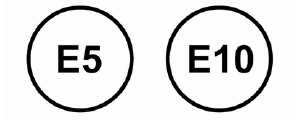Opel Corsa: Fuel / Fuel for petrol engines

Only use unleaded fuel that complies with European standard EN 228 or E DIN 51626-1 or equivalent.
The engine is capable of running with fuel that contains up to 10% ethanol (e.g. named E10).
Use fuel with the recommended octane rating. A lower octane rating can reduce engine power and torque and slightly increases fuel consumption.
Caution
Do not use fuel or fuel additives that contain metallic compounds such as manganese-based additives. This may cause engine damage.
Caution
Use of fuel with a lower octane rating than the lowest possible rating could lead to uncontrolled combustion and engine damage.
The engine specific requirements regarding octane rating are given in the engine data overview. A country-specific label at the fuel filler flap can supersede the requirement. In certain countries, the use of a particular fuel, e.g. a specific octane rating, may be required to ensure proper engine operation.
 Fuel
Fuel
..
 Fuel for diesel engines
Fuel for diesel engines
The Diesel engines are compatible
with bio-fuels that conform to current
and future European standards and
and can be obtained from filling
stations:
Diesel fuel that meets standard
EN590 mixed with a biofuel that
meets standard EN14214 (possibly
containing up to 7% Fatty Acid Methyl
Ester)...
Other information:
Opel Corsa 2020-2026 Owners Manual: Tightening torques
Caution If the vehicle is equipped with alloy wheels, tighten the wheel bolts manually at least for the first five turns. There are two different types of wheels with two different bolts and tightening torques. Tightening torque for alloy wheels is 115 Nm...
Opel Corsa 2020-2026 Owners Manual: Switching off the system
Press , the speed limiter mode is deselected and the speed limit indication extinguishes in the Driver Information Centre. Pressing to activate cruise control deactivates speed limiter. The preset speed remains in the memory when the ignition is switched off...
Categories
- Manuals Home
- 6th Generation Corsa Owners Manual
- 6th Generation Corsa Service Manual
- Power outlets
- High beam. High beam assist
- Manual seat adjustment
- New on site
- Most important about car
